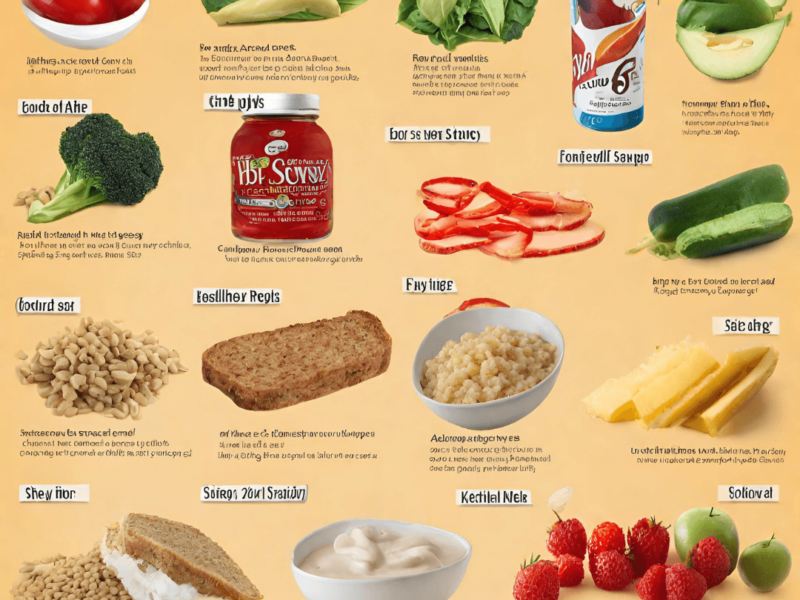Four Immune Health Supplements to Avoid, According to Dietitians
Immune health is a topic that often garners a lot of attention, especially during flu seasons or times of heightened health concerns. With the myriad of supplements available on the market, it can be tempting to turn to them for an extra boost to our immune system. However, not all supplements are created equal, and some may even do more harm than good. In this article, we will explore four immune health supplements that dietitians advise avoiding.
Introduction
In the midst of COVID-19 and other immune-related concerns, many individuals are seeking ways to bolster their immune system. While a healthy diet and lifestyle are the foundation of good immune health, some turn to supplements in the hopes of an added safeguard. However, not all immune health supplements are created equal, and it is important to be cautious and informed when considering these products.
The Importance of a Healthy Immune System
Our immune system plays a crucial role in defending our bodies against pathogens and diseases. It is responsible for identifying and eliminating foreign invaders that threaten our health. A strong immune system is essential for overall well-being and can help reduce the risk of various illnesses.
The Role of Diet in Supporting Immune Health
Nutrition is a vital component in supporting a healthy immune system. A well-balanced diet that includes a variety of fruits, vegetables, whole grains, lean proteins, and healthy fats provides the necessary vitamins, minerals, and antioxidants that support immune function. Consuming a range of nutrients from food sources is generally more beneficial than relying on supplements alone.
The Popularity of Immune Health Supplements
With the increasing interest in immune health, the supplement industry has seen a surge in products claiming to boost immunity. From vitamins and minerals to herbal remedies, there seems to be a supplement for every immune-related concern. However, it is important to approach these products with caution and consider their potential drawbacks.
Why Some Immune Health Supplements May Be Avoided
While certain supplements may have immune-boosting properties, there are several reasons why dietitians advise against relying solely on these products for immune health support.
Lack of Scientific Evidence
Many immune health supplements lack substantial scientific evidence to support their efficacy. While anecdotal reports and marketing claims may suggest otherwise, it is important to critically evaluate the available research before investing in a particular supplement.
Potential Interactions with Medications
Some immune health supplements may interact with medications, potentially affecting their efficacy or causing adverse reactions. For example, certain supplements may interfere with blood thinners or medications used to manage chronic conditions. It is crucial to consult a healthcare provider or dietitian before starting any new supplement.
Side Effects and Potential Harm
Certain immune health supplements may cause side effects or even be harmful when taken in excessive amounts or for prolonged periods. It is important to be mindful of the recommended dosages and potential risks associated with specific supplements.
Specific Immune Health Supplements to Be Cautious About
While the supplement market is flooded with various immune health products, the following supplements have garnered attention due to potential concerns:
Echinacea
Echinacea is a popular herb often marketed as a remedy for cold and flu symptoms. However, scientific evidence supporting the efficacy of echinacea in preventing or treating these conditions is limited. Additionally, some individuals may experience allergic reactions or other side effects when taking echinacea.
Vitamin C in High Doses
Vitamin C is frequently touted as an immune-boosting supplement, especially during the cold and flu season. While it is true that vitamin C plays a crucial role in immune function, megadoses of the vitamin may not provide additional benefits. In fact, excessive amounts of vitamin C can lead to gastrointestinal discomfort, diarrhea, and even kidney stones.
Zinc
Zinc is often marketed as a supplement to support immune health and shorten the duration of cold symptoms. However, research on the efficacy of zinc in preventing or treating colds is inconsistent. High doses of zinc can also interfere with the absorption of other minerals and may cause nausea, vomiting, and other side effects.
Elderberry
Elderberry supplements have gained popularity as a natural remedy for cold and flu symptoms. While elderberries contain antioxidants and potentially beneficial compounds, more research is needed to establish their effectiveness and safety. Additionally, certain elderberry products may contain high levels of cyanide-inducing compounds, making them potentially toxic if consumed in large amounts.
Other Popular Supplements
Other popular immune health supplements, such as garlic, probiotics, and vitamin D, may have varying levels of evidence supporting their immune-related benefits. While these supplements may offer some potential advantages, it is important to consult a healthcare provider or dietitian to determine their appropriateness and potential risks.
The Importance of Consulting a Dietitian or Healthcare Provider
When it comes to immune health and supplementation, it is crucial to seek guidance from a qualified healthcare professional or registered dietitian. These experts can help evaluate an individual’s specific needs, assess potential interactions with medications, and provide evidence-based recommendations.
Conclusion
While the immune health supplement market may be enticing, it is essential to approach these products with caution. While some supplements have shown potential benefits, many lack scientific evidence or may have unwanted side effects. Maintaining a well-balanced diet, engaging in regular exercise, managing stress, and getting adequate sleep are fundamental pillars of immune health. When considering supplementation, consulting a healthcare provider or dietitian is imperative to ensure safety and efficacy.
FAQs
1. Are there any immune health supplements that are recommended by dietitians?
– While dietitians advise caution with immune health supplements, they may recommend certain supplements based on an individual’s specific needs and deficiencies. It is best to consult with a qualified professional for personalized recommendations.
2. Can taking immune health supplements alone protect against COVID-19?
– No, taking immune health supplements alone is not a guarantee of protection against COVID-19 or any other illness. Supplements should be seen as a complement to a healthy lifestyle, including proper hygiene practices and following guidelines from healthcare authorities.
3. Can a healthy diet replace the need for immune health supplements?
– A well-balanced diet that includes a variety of nutrient-rich foods can provide the necessary support for the immune system. Supplements should not replace a healthy diet but can be considered as a supplement to address specific needs under the guidance of a healthcare professional.

